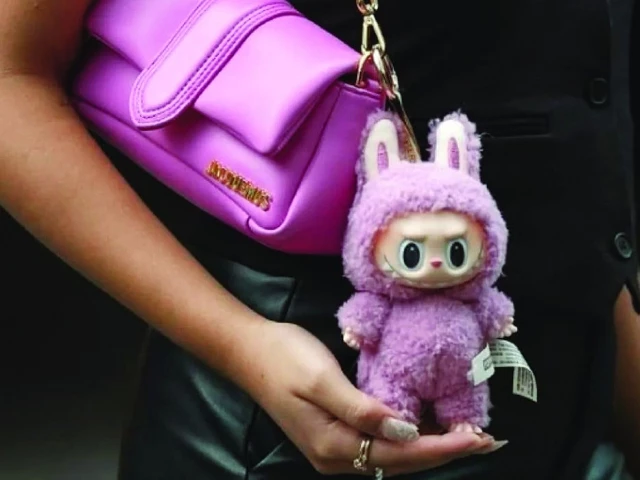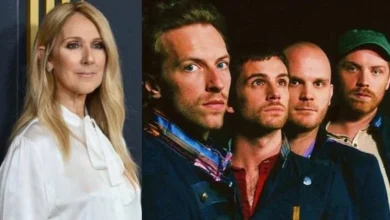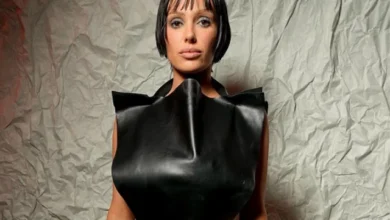With their gnarled teeth, wild expressions, and cuddly bodies, Labubu dolls are an unlikely luxury accessory, but that’s exactly what they’ve become. Originally created by Hong Kong-born artist Kasing Lung as part of his “The Monsters” series, Labubu first appeared in 2015. “At that time, there were no game consoles or computers, so I had to draw dolls with a pen, so I had the idea of painting fairy tales since I was a child,” Lung said in an interview with Hypebeast.
Inspired by Nordic folklore and his own vivid imagination, Lung’s creations were brought to mass popularity after his 2019 collaboration with Chinese art toy giant Pop Mart. Since then, Labubu has exploded in cultural visibility, moving from niche toy collector feeds to mainstream fashion content on TikTok and Instagram, and even landing in the hands of celebrities like Rihanna and Blackpink’s Lisa.
On social media, influencers and fashionistas have been clipping Labubu dolls to their Hermès Birkins, Chanel crossbodies, and Dior totes, turning these bug-eyed monsters into the latest symbols of “Big Into Energy” style. As fashion writer India Roby puts it in Who What Wear, Labubu charms have become the ultimate flex: a mix of luxury and levity that doesn’t take itself too seriously. It appears that the absurdity of pairing a thousand-dollar monster toy with a USD20,000 handbag is exactly the point.
This movement is part of the broader “kidult” trend, where adults embrace objects from childhood for comfort, whimsy, and, let’s face it, content. Labubu’s appeal also hinges on Pop Mart’s signature “blind box” model: you don’t know which design you’re getting until you open it. This gamification, combined with limited editions and seasonal drops, fuels a massive resale market, where rare Labubu dolls can fetch over USD1,000, as reported by The Guardian.
Content creators have amplified this trend further. TikToker Suki Crafts, who customises Labubu dolls into full fashion looks, has over 1.2 million likes on her videos. On Instagram, the account Labubu Deluxe curates daily images of Labubu styled in designer outfits, often with satirical or ironic captions. “It’s fashion, it’s feral, it’s fabulous,” reads one viral post. Users flood the comments with “need,” “iconic,” and “capitalism won.”
Taking the world by storm
According to Pop Mart’s official quarterly sales data, Labubu was the top-performing character IP in Q1 2024, with sales accounting for over 22 per cent of total brand revenue. The company reported that demand for Labubu series figures increased by 187 per cent year-on-year. To meet growing global demand, Pop Mart announced in March 2024 that it would expand its manufacturing capacity, with a new production facility planned in Chengdu.
Internationally, Pop Mart has also been scaling up its retail presence. New stores dedicated to Labubu and other collectibles have opened in Tokyo’s Harajuku district, Seoul’s Hongdae, and New York’s Times Square. In April 2024, Pop Mart launched a limited-time Labubu pop-up café in Shanghai, serving themed desserts, drinks, and exclusive merchandise. The café attracted over 10,000 visitors in its first week, according to China Daily.
Pop Mart’s online flagship store on Tmall hosted a Labubu-themed livestream sale on May 3, 2024, which drew over 2.3 million viewers and generated more than USD3.5 million in sales in under two hours. New product lines included crossover collaborations with fashion designer Angel Chen and tech accessories brand CASETiFY.
In addition, Pop Mart has started rolling out Labubu-themed vending machines, called Robo Shops, across Southeast Asia. Locations in Singapore’s Orchard Road and Kuala Lumpur’s Pavilion Mall have seen long queues, especially during weekend restocks. The machines dispense both standard and exclusive blind box editions.
It’s this perfect collision of chaos and curation that explains why Labubu has stuck. In an age where luxury is less about old money polish and more about niche internet aesthetics, Labubu dolls hit the sweet spot between collectible culture, personal expression, and emotional nostalgia.







